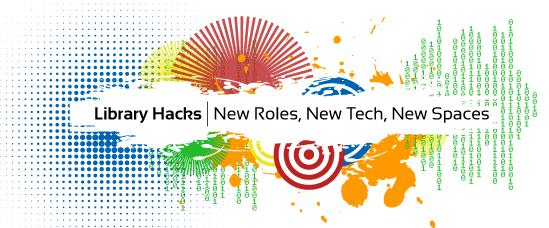Fall 2014 Conference
Library Hacks: New Roles, New Tech, New Spaces
October 30, 2014
Download Business Meeting Slides
Keynote: Open Source Your Library (Download)
There has never been a better time for libraries interested in open-source software: server space is getting cheaper all the time, open-source communities are friendly, and libraries are working together to hack new services for their patrons. There are certainly challenges to getting started, such as knowing what kind of expertise your library might need, where you can get help, and how to choose open-source products that will provide the biggest benefit for your library. At California State University, Northridge, we’ve set up a sandbox server that we use for experimenting with open-source software like Islandora and Guide on the Side. This presentation will discuss how your library can create an experimental sandbox for using open-source software, develop new skills and harness existing talents, and hack your library services for the better.
Presenter: Lauren Magnuson, California State University, Northridge.
Unique Collaborations: How an academic library became a partner in creating programs for developmentally disabled adults (Download)
This presentation will discuss a “New Role” that academic libraries can fill: providing space for and programming for developmentally disabled adults within the community. Librarian Natalie Bennett, while at Niagara University, collaborated with Kim Groff, of the Department of Education and the community agency Niagara Cerebral Palsy, to create Career Awareness through Technology Skills development (C.A.T.S.), an 8-week program that brought fifteen individuals with developmental disabilities into the library for technology and job skills training. Listen to Natalie and Kim discuss how they built the curriculum and dealt with the logistics of bringing those folks on campus. This program was incredibly rewarding to everyone involved, and Natalie and Kim think it is really worthwhile for other academic libraries to consider!
Presenter: Natalie Bennett, University of Tennessee at Chattanooga
On Demand Geeking (View)
At Amherst Public Library we believe in providing technology assistance where it is needed. We tried scheduling computer training classes, but no one, or very few would sign up. So, instead the library advertises one-on-one technology assistance. Patrons can make appointments to meet with a reference specialist for a personalized consultation on their device or laptop. We will sit down withthe person and troubleshoot simple computer problems, help them figure out how to use their new Windows 8 laptop, or how to get their downloadable audiobook to play on their device. There have been several instances where we have saved the patron quite a bit of money and aggravation by simply taking the time to listen to their particular problem and figuring out the best way to communicate the solution. One particularly moving encounter involved a patron with sight and hearing impairments who received assistance on using his iPad. Another involved an outreach patron who received a Kindle with his requested ebooks through outreach and was trained on how to use it. The service has been well received and has several repeat customers.
Presenter: Victoria Vogel, Amherst Public Library, Amherst, Ohio
What is LITEBox, IN? (Download)
Library Information Technology Education Box, or LITEBoxIN, is a prong of the fork that is LibraryBox created by Jason Griffey, a library friendly version of the PirateBox, “a DIY anonymous offline file-sharing and communications system built with free software and inexpensive off-the-shelf hardware” (piratebox.cc). Libraries all across the state and this great nation have issues, nay, volumes with technology training and every librarian knows at least one person who tells library users, “let me go get the tech person to answer that question.” Many don’t know where to start, and more don’t know where to go from here. The public needs us, the library user needs librarians more than ever, especially with regards to technology. In addition to thousands of Public Domain books, these special LibraryBoxen will include easy to access files with step-by-step instructions on many “simple to you and me” things every library staff member will one day help a patron with in their careers. How to for me and you. The LibraryBox provides a WiFi signal to a standalone server (flash drive) and is not dependent upon the open internet, thus even the remotest of libraries without access to e-books will be able to offer this to their patrons. This is a project of the Indiana Librarian Leadership Academy 2014 Cohort, we hope to put LibraryBoxen in every public library in the state of Indiana (to start) and expand this program to academic and special libraries, and offer this awesome open-source technology to everyone supplemented by a crowd-sourced knowledge base with limitless possibilities that strives to be a self-sustaining project over time, and limitless possibilities. Please help us spread the word about this technology and raise awareness of this INLLA project- the awesomest one to date in our humble approximation. Just imagine the possibilities!?
Presenters: Jonathan Gaskill and Austin Stroud
Putting Users First: Managing the LibGuides 2.0 Migration (Download)
The release of LibGuides 2.0 by Springshare provides a key opportunity to re-evaluate how the library manages its system of research guides and take advantage of new functionality. Beginning in the summer of 2014, Northwestern University Library began its transition to LibGuides 2.0. This presentation will describe our process for managing change in a way that allows us to better integrate the user’s perspective in our new and improved service. We will focus on how we gathered user feedback, from both students and staff, and how we plan to continue integrating their perspective moving forward.
Presenters: John Hernandez & Lauren McKeen, Northwestern University, Evanston, IL
Bootstrap, LibGuides, & Potential Web Domination (Download)
During the Spring/Summer of 2014 the Marketing Department at the University of Saint Francis redesigned the university’s website, of which the Vann Library website is a part. Marketing/UTS had always managed the library website. The library was granted some control over the content of the site, but there were limitations as far as design and functionality (i.e. specific menu type/style, limited scripting to enhance the site). From the start, the Marketing Department stressed that the site redesign would focus on “alumni and potential students.” Needless to say the Vann Library site, which is a tool primarily used by existing students, was not prioritized during the redesign. The website handed over to the library mismanaged page space, provided navigation that was overly complex, and rendered options for searching the library collection and databases virtually invisible. All in all, it was not a very useful website. This redesigned site used Twitter Bootstrap for the framework.About this same time, Springshare began touting the new version of LibGuides, which also utilizes the Twitter Bootstrap framework. After some playing around in our beta LibGuides 2 site, we learned that we could recreate the USF webpages identically as a LibGuide. So the decision was made to move our entire library website to LibGuides. The library now has full control of site look/feel as well as content. Because of the underlying Bootstrap framework, our site does still align with the university’s overall design, giving users some consistency between the university site and the library site. The fact that the site is under library control has allowed us to optimize page space, highlight our search tools, and provide site navigation that is more functional in a mobile environment. Ultimately, the flexibility of LibGuides 2 presents librarians with the opportunity to regain control of their library’s web presence.
Presenters: Cort Eyer & Celia Price, University of Saint Francis, Fort Wayne, IN
Quick and Easy eReaders (View)
In the summer of 2014, TCPL introduced 30 pre-loaded Kindles for checkout. Head Technology Librarian, Neal Starkey will discuss the planning, funding and implementation process. Get tips on providing this service to your patrons at any budget level.
Presenter: Neal Starkey, Tippecanoe County Public Library
Best Practices for “Embedded” Library Instruction
This presentation will review strategies for teaching library instruction for blended/online courses. It will discuss important elements to consider for design and delivery with focus on such models as Quality Matters and Community of Inquiry. This presentation will discuss how to develop online learning objects when online instructors do not want to “embed” library instruction into their courses. Finally, this presentation offer suggestions for the development of interactive student activities to promote information literacy and information fluency.
Presenter: Mary Hricko, Kent State University
ACPL Family App
Smart phones and other digital devices are the fastest growing tools with which our patrons of all ages engage. The rapidly increasing number of children, parents and care-givers using smart phones creates both a need and an opportunity for a mobile application presence that directly addresses this audience, inviting them into the life of the library. The ACPL Family App is designed for parents and caregivers of children of all ages, from birth all the way through elementary school. It’s intended to be used by adults and children together, promoting age–appropriate learning and literacy development.Participants at this session will learn about the ACPL Family App’s unique features, its history and ongoing development, and its uses.
Presenter: Kris Lill, Allen County Public Library
Transformations: Migrating to a New Model of Web Stewardship (Download)
Do you ever feel that although you are charged with running your website, it might actually be running you? We understand. Come and hear the epic tale of how the IU Bloomington Libraries migrated over 8000 pages from a decade-old locally-developed content management system to a shiny new Drupal-powered site by partnering with outside consultants — and, along the way, learned a few things about strategy and governance that are broadly applicable to web redesign or migration projects, small or large.This session will describe how a small department discovered the secret to making a better web experience for our users lay in thinking holistically and strategically about our web content — in other words, in stewardship. No longer just chasing pages around, we were freed to invest our efforts into crafting a user-centric, sustainable web presence. Attendees will walk away with new ideas and concrete strategies for prioritizing the end-user’s experience through emphasizing consistency and reducing clutter; introducing library staff to a new way of thinking strategically about web content (content strategy); and providing a more seamless discovery experience.
Presenters: Courtney Greene McDonald, Anne Haines, and Rachael Cohen, Indiana University Libraries

